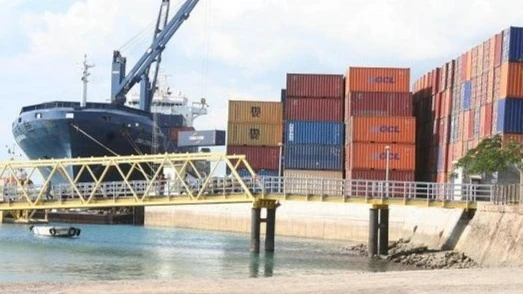Cargo delays persist at Zanzibar port

Shipping companies and cargo stakeholders are facing extended delays at Zanzibar's Malindi Port, with vessel waiting times now reaching approximately 35 days, according to a customer advisory issued today.
According to an advisory notice issued by Maersk yesterday, the congestion, ongoing since February 2025, is largely attributed to the prioritization of bulk cargo vessels carrying food and essential goods—a critical move aimed at safeguarding community supply chains. However, this has significantly disrupted the flow of containerized cargo to the island.
The Maersk’s advisory highlights that even feeder vessels deployed to ease the backlog are experiencing similar delays, with congestion now spreading to alternative berths. As a result, extended transit times and irregular service schedules have become the norm for shipments bound for Zanzibar (ZNZ).
In response to the crisis, shipping operators have begun implementing both short- and long-term measures to mitigate the impact.
“One of the key steps taken is the deployment of additional capacity via the FEF barge service, which accesses an alternate berth with comparatively shorter waiting times of 10 to 13 days. So far, this route has enabled the clearance of approximately 1,500 metric tons (MTS) of backlogged cargo,” the notice said.
“Port access and berth allocation are also under review. Ongoing discussions with port authorities and terminal operators are aimed at improving berth efficiency and reducing turnaround times for vessels.”
Additionally, the notice explained that a comprehensive service review is underway by network planning teams, with a focus on adapting schedules and routing strategies to align with Zanzibar's evolving operational environment.
The ultimate goal is to avoid severe backlogs in the future and maintain a reliable supply chain for the island.
Shipping lines have expressed regret over the delays and thanked customers for their continued patience. “We sincerely apologize for the inconvenience caused and appreciate your understanding as we work to resolve this situation,” the statement read.
Zanzibar’s Malindi Port remains a vital logistics hub for the region, and efforts are ongoing to ensure that both essential and commercial cargo can flow with minimal disruption in the months ahead.
Average port stay for container ships at Zanzibar rose to 4.4 days as of April 14, 2025—up from around 3.9 days in late March 2025. The weekly average since early 2022 is about 3.75 days.
Despite these congestion challenges, Malindi Port has demonstrated significant revenue and operational gains, largely attributed to the public-private partnership with the Zanzibar Multipurpose Terminal (ZMT).
Under this arrangement, government revenues from port royalties rose by 41 percent—from an average of 1.42bn/- monthly in early 2024 to about 2.07bn/- per month by January 2025.
The port has also reduced ship turnaround times from a previous range of 20 to 40 days down to as low as 8 days by late 2024.
For the fiscal year 2024–25, the Zanzibar Port Authority (ZPA) set ambitious operational targets. These include handling nearly two million metric tons of mixed cargo, over 68,000 twenty-foot equivalent units (TEUs) of containers, and around 158,000 tonnes of fuel. Infrastructure developments are also underway to support these goals.
Top Headlines
© 2025 IPPMEDIA.COM. ALL RIGHTS RESERVED

























